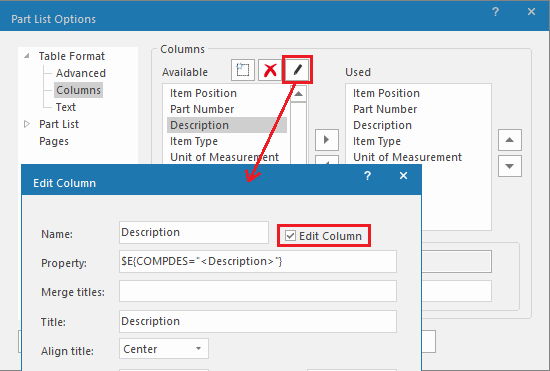



Edit Edit Part Properties
Edit Part Properties Edit
Edit
The Edit command enables you to edit the selected component Part Properties.
| The command selection list features the following option: | |
| Component | This selector enables you to select the component of which you wish to edit the Part Properties. |
When you select the component, the program displays a dialog box that enables you to edit the Part Properties of the selected component. You can customize the part properties using the XMLEditor tool. However, you can also customize part descriptions bearing <> symbol as postfix from the dictionary.
The Edit Part Properties area collects the actual Part Data fields. Refer to Part Properties Tab of the File Properties Dialog Box for details on how to use these controls.
The command dialog box also enables you to execute the following commands:
Availability from the context menu in the Part List Editor table
It is possible to launch the Edit Part Data command from the context menu Edit
Part Properties option of the Part List Editor table. It will be shown in the
context menu upon selection of only one row.
On closure of the Part
Data dialog, the part list is updated.

Add custom properties shown as check boxes
Data properties could of Integer, Text and Real data types and, if a new
custom properties named like “anyname_BOOL” is added and its data
type is Integer, we internally consider it as Boolean in the Part List Editor.
This property will
be shown as check-box in the part list editor. If the value of the property is
0, then the check box in Part List for that component will be unchecked, else
checked.
Example:
Here a user wants
to create a new property called IGNOREINBOM_BOOL, which has to be shown as
Check Box in part list.



Differentiate the hidden and unhidden components rows in Part List Editor table
When the user selects a row, the corresponding node in the model structure is highlighted. An hidden icon is attached to the node if the component is not displayed.
The context menu shows Hide Entities or Unhide Entities or both, depending on the components selected in the Part List.

Restrict users to enter only specific data type while editing the cells in Part List Editor
Each column is a property and has a data type associated. We restrict users from entering any other data type in the column.
Example: RELQTY is of data type Real and hence doesn’t accept any Characters while typing.
The Part List Editor has is improved for the MoldDesign user.
You can configure whether the column in the dialog box is editable or read only.
You can automatically calculate the size (bounding box) of a component and include it in the Part List.
The Part List Editor contains two extra columns, which show the COMPONENT NAME and the HIERARCHY LEVEL of the component in the assembly. These columns are fixed and not editable.
Another important feature is the presence of the Hide entities and the Unhide entities commands in the context menu along with the Zoom Entities command; after selecting a component, they can hide/unhide the selected entities to allow you a better visualization of your model.
The Editable Property check box enables you to configure whether the column in the Part List Editor dialog box is editable or read only.

Two further properties are available in the list of columns in the Table Format - Columns category of the Part List Options dialog box:
| CompSizeAuto | It is a checkbox in part list editor and determines whether the size has to be automatically calculated. When selected, the program automatically calculates the size of the component; the content of the corresponding field of the CompSize column is not editable. When cleared, the string in the corresponding field of the CompSize column is editable. By default the check box is selected. |
| CompSize | It is a string like 142L x 82W x 17H (length x width x height). The automatic value is the bounding-box of the component with respect to the axis of the component itself. |